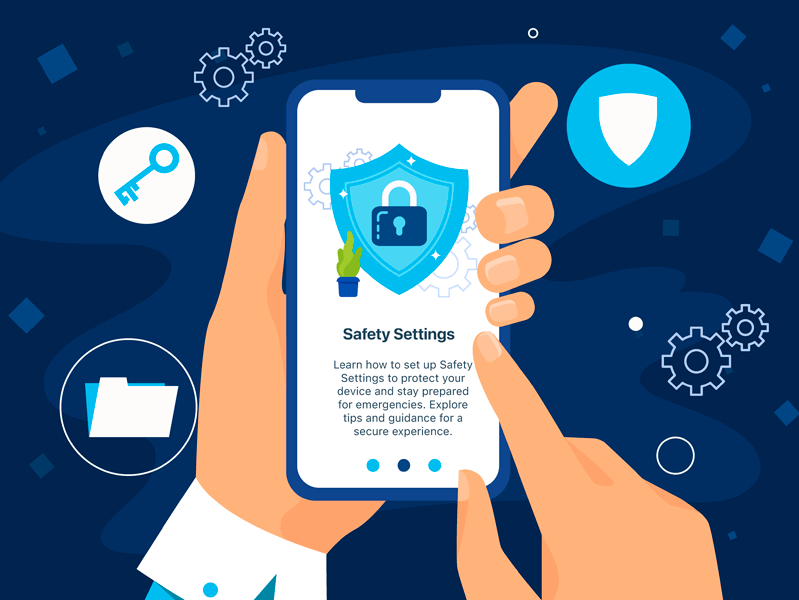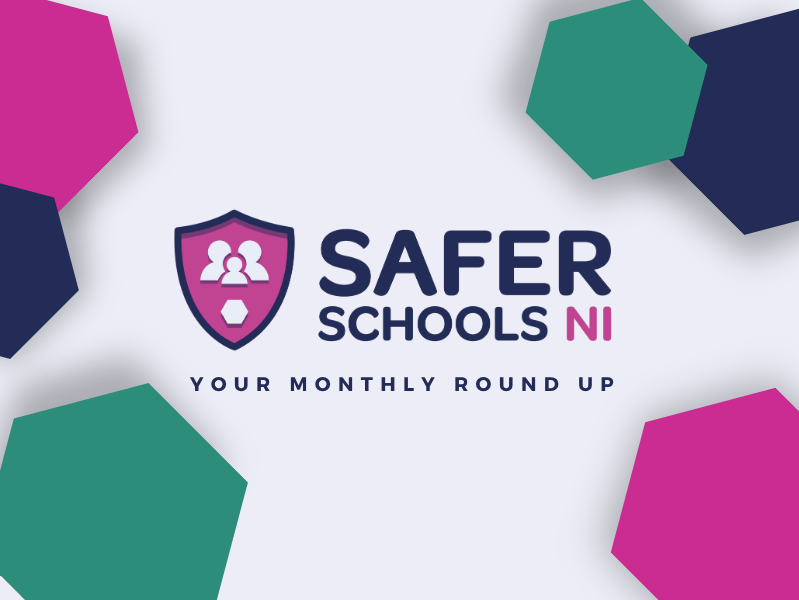Last Updated on 9th June 2023
Read the script below
Natalie: Hello and welcome to Safeguarding Soundbites!
Colin: We’re the online safeguarding news podcast that brings you a roundup of all the week’s top stories and safeguarding advice. My name’s Colin.
Natalie: And I’m Natalie! This week, we’re going to be giving you some news updates as always, but a small disclaimer, some of our topics today are sensitive so if you’re listening to this episode in the car with a child, I’d suggest you tune in again later.
Colin: Our first story of the week has to do with smartphones, social media, and the concern that not enough research has been put into the potential impact they could have on the mental health of children and young people. Conservative MP Miriam Cates stated there is an urgent requirement to assess this impact, specifically through use of devices and social media apps. She stated that smartphones are “as addictive as cigarettes” and likened poor mental health rates to the amount of hours spent on social media.
Natalie: Some of the concerns Ms Cates shared were around the potential exposure to harmful content that children could experience, naming “violent pornography”, suicide, and eating disorder content.
Colin: Now these are some of the issues that have inspired the creation of the Online Safety Bill.
Natalie: That’s correct, Colin. However, as the Online Safety Bill is still being passed through parliament, Ms Cates argued that further measures needed to be put into place to try and protect children from harmful content, such as stronger age-verification measures. She emphasised this by saying that “prevention is better than cure” and that action without addressing the root of the problem was “a bit like having a leaky roof and calling for ever larger buckets to catch the drips. We need to fix the roof.”
Colin: What an excellent analogy!
Natalie: Isn’t it? Let’s hope that conversations like these are an indication of the commitment the government has to improving the mental health crisis happening for children and young people in the UK.
Colin: Certainly. It’s important for everyone to have conversations around the impact of online life for children and young people today. This includes in the home with parents and carers, and at schools and colleges with teachers. The online world is here to stay, and the better we become at integrating this part of life into our offline world, the safer children and young people will be.
Natalie: Absolutely. One of the best ways you can do this at home or in school is to seek out resources that are trusted and relevant to what the children and young people in your care are experiencing – and good job you, because this podcast is one of those very resources!
Colin: It certainly is, Natalie.
Natalie: Now it’s rare that a month goes by without news of a viral challenge causing harm to a child in the UK. Earlier in the week, there were reports of a young boy in a Scottish school who had died after engaging in a choking game that was a part of an online challenge.
Colin: This story is truly heartbreaking. While official sources have now said the boy died of natural causes and that there is no evidence he was taking part in an online challenge, it brings a renewed concern around online challenges and their potential dangers.
Natalie: The game in question is called ‘Tap Out’, which involves the restriction of air supply until the player almost passes out.
Colin: There is no confirmation that this game led to his death and official sources have maintained that this is not a criminal case.
Natalie: Regardless of the events that led to his death, it is still a tragedy that an entire school community will have to face.
Colin: Exactly. The school in question is a part of our Safer Schools Scotland area, and the entire team at INEQE/Safer Schools would like to extend our thoughts to the family and the wider school community at this tragic time.
Natalie: To help keep yourself aware of the dangers online challenges can create, head to our website and download our ‘Responding to Online Challenges, Trends, and Hoaxes’ shareable.
Colin: Now our next story comes from a report released this week about child sexual abuse materials, also referred to with the acronym CSAM. The Stanford Internet Observatory (SIO) investigated the scope and scale of how self-generated CSAM are spread, sold, and traded online.
Natalie: Just for any of our listeners who maybe aren’t familiar with that term, could you explain what that is?
Colin: So self-generated child sexual abuse materials are videos or images that have been created by a child under the age of 18. The material depicts sexual activity, nudity or semi naked materials of them and/or another child.
Natalie: So what were some of the key findings of the report?
Colin: Well, the investigation found that there are large networks of accounts that are openly advertising self-generated CSAM on social media. Worryingly, some of these accounts are being run by imposters, scammers and third parties coercing children. However, these networks by and large are being operated by children who are producing and marketing sexual abuse content of their own accord. The material is then being sold or traded for gift cards or money. The SIO reports that Instagram seems to be the most popular platform and its recommendation algorithms are the key reason why it’s so effective for users to advertise on.
Natalie: Have Instagram responded to the report?
Colin: Meta, Instagram’s parent company, have announced they are now setting up a task force to investigate the claims about Instagram hosting self-generated CSAM.
Natalie: Okay. And this isn’t just on Instagram, to be clear?
Colin: No, it seems Twitter have failed to deal with CSAM reported on the platform, messaging app Telegram were mentioned as they implicitly allow the trading of CSAM in private channels and Discord, too.
Natalie: This is really concerning, but it sounds like something Ineqe will want to examine further. In the meantime, what can parents and carers do if they are worried about their child’s images being distributed online?
Colin: Absolutely. Well, if a child or young person tells you that they have lost control of an image or video, the first thing to do is thank them for coming to tell you, and to remain calm. Reassure them that there are steps you can take together. Encourage the child to seek support from ChildLine. Adults can speak to the NSPCC adult helpline for support for themselves too. The Internet Watch Foundation have an tool called Report Remove which helps to remove CSAM images from online platforms. Together with the child or young person, write a list of where the image has appeared and who it’s been sent to, including account usernames – you can take a screenshot of any profile photos or other details. You can also make a report to the Child Exploitation and Online Protection Command (CEOP) and contact your local police force.
Natalie: Those steps are really helpful – thank you Colin.
In last week’s episode of Safeguarding Soundbites, we talked about the pressures many pupils feel at this time of year due to exams. Unfortunately, this week we’re hearing reports of how scammers are taking advantage of this by selling so-called leaked exam papers on social media.
Colin: The exam board has said it is extremely rare for genuine papers to be leaked, and the reports have included cases where someone has paid for an exam paper, then the user simply blocks them, and they never receive anything.
Natalie: This is a scam and it’s taking advantage of the stress that young people are feeling at this time of year.
Colin: This is something that parents, carers and teachers should be addressing with their young people and explaining that this is happening, and that if they see an exam paper for sale on social media, it could be a scam.
In local news, the government is updating the requirements for relationships and sexuality education in Northern Ireland. This will include educating adolescents on issues such as how to prevent pregnancy, the legal right to an abortion in Northern Ireland and how relevant services may be accessed. It will also create a statutory duty on the Department of Education to make regulations around which a pupil or parent of a pupil may ask to be excused from receiving that education or specific elements of that education.
Natalie: Actually, I have some more local news for us, Colin – in our safeguarding success story of the week!
Colin: Brilliant!
Natalie: It’s a lovely story this week. The Irish Society’s Primary School from Coleraine attended a dementia support group. The event was organised to help try to break the stigma associated with living with the condition dementia. At the event, everyone took part in arts and crafts and there was also some Zumba happening too.
Colin: Aww that sounds like a great time – and for a really important cause too.
Natalie: Yes, absolutely. Events like this help to break down assumptions and stereotypes about dementia and also encourage communities to come together.
Colin: Shall we go Zumba dancing, Natalie?
Natalie: What, now?!
Colin: Why not?
Natalie: Okay, you’re on! Shall we say goodbye to our listeners first?!
Colin: Yes, that’s probably a good idea…And of course, before we go, we need to also remind you that you can download the Safer Schools NI App right now for free, on whichever app store you get your device’s apps from.
Natalie: And you can follow us by searching for Safer Schools NI on social media.
Colin: That’s all from us for this week – until next time…
Both: Stay safe!
Join our Safeguarding Hub Newsletter Network
Members of our network receive weekly updates on the trends, risks and threats to children and young people online.
Who are your Trusted Adults?
The Trusted Adult video explains who young people might speak to and includes examples of trusted adults, charities and organisations.
Pause, Think and Plan
Use our video for guidance and advice around constructing conversations about the online world with the children in your care.








